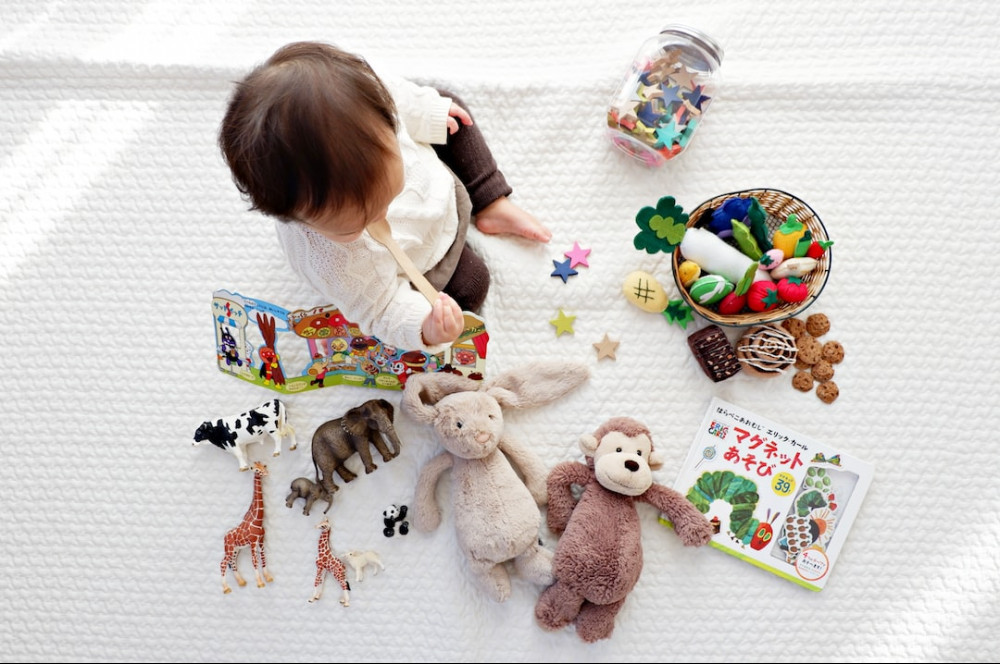The same basic guidelines will continue to apply to your baby at 6 months old. If stimulating a baby in the first few months
of life takes creativity, it would take sophistication in your approach to a baby reaching the half-year mark.
Your baby is ready to take an active role in the learning process and to coordinate the senses – seeing what’s being
touched, touching what’s being tasted, looking for what’s being heard.
What Your Baby At 6 months old May Be Doing
Your baby is able to sit upon his own without requiring any support. He/she pushes head, chest and shoulders off the floor
when face down. Your baby would show signs of crawling by drawing one knee up to his tummy. Makes energetic body
movements to propel himself when on the floor. He/she is becoming more adept at rolling from front to back and back to
front, twists and turns in all directions.
Hand – Eye Coordination
Your baby now uses both hands in synchrony and can pass objects from one hand to the other. He/she would keep
watching a toy that falls from his grip. Plays with toys purposefully instead of just mouthing them. Enjoys dropping a toy
and picking it up again repeatedly. Tries to feed himself/herself by putting food to his mouth with his fingers. Pick up tiny
object with any part of thumb and finger.
Learning
He/she recognizes himself in a mirror or photograph. He would switch his stare from one object to another as if comparing
them. Actively reaches out for toys. Is now able to differentiate mommy and daddy by their voice. Introduce concepts such
as coffee is hot, car goes fast, teddy is soft, towel is for dying, soap is for washing, etc. Play peek-a-boo game with your
child.
Language
Receptive language (understanding what you say) will come before spoken language. Encourage imitation and that would
encourage language development, Emphasizing and repeating the keywords like dog and barks, cat and meow, etc.
May start to understand the meaning of ‘no’. Synchronizes his speech with yours as though in conversation. Laughs when
happy and screams when angry. Makes gurgling noises when playing. Begins to react to the moods of the music that
he/she hears.
Social and Emotional
Playfully holds on to a toy when you try to remove it. Chuckles in anticipation when you come towards him. Turns toward
the direction where he hears his name. Coos or stops crying in response to familiar music. May become anxious in strange
company and begin to cry. So this is the perfect time to encourage socialization, to expose your child to a variety of people
of different ages – from other babies to older people. Teach him simple greetings like “hello”, and waving bye-bye, blowing
a kiss, and saying thank you.

Baby Foods at 6 Months old
Commercial Baby Food
Today’s commercial baby food, for the purpose of convenience, that comes in a ready-to-serve, baby portion jars,
recloseable for refrigerated storage of leftovers, has the advantage in its use in the early months of starting solid foods.
The strained varieties are the perfect consistency for beginners. And the single-ingredient starter foods make it easy to
screen for allergies. The food is consistent in texture and taste, and are safe and sanitary. They are also relatively
economical, particularly if the time you save by using them is valuable to you, and when you consider that less food is
likely to be wasted than when you prepare large batches.
Since the fruits and vegetables are cooked soon after picking, they retain a reliably high proportion of their nutrients.
Of course, not everything sold as “baby food” is good for babies. Read labels, and avoid such ingredients as sugar or corn
syrup, salt, modified food starch and other thickeners, partially or completely hydrogenated shortening or fat, mono sodium
glutamate (MSG), artificial flavors or colors, and preservatives.
Home -Prepared Baby Foods
If you have the time, the energy, and the motivation, there’s nothing wrong, of course, with making your own baby –
assuming you follow these rules:
* When introducing a new food, prepare and serve it without any other ingredients.
* Don’t add sugar or salt. If you are cooking for the whole family, remove baby’s portions before adding salt and spices.
* Don’t cook in copper pots, as this may destroy Vitamin C.
* Don’t cook acidic foods (such as tomatoes) in aluminum, since this can cause small quantities of aluminum to dissolve and be absorbed into the food.
* Steam, pressure-cook, or waterless-cook vegetables, exposing them to a minimum of light, air,.heat and water.
* Boil, microwave, or bake potatoes in their skins and peel after cooking.
* Never add baking soda, it may preserve color but it depletes vitamins and minerals.
* Don’t soak or boil dried legumes (beans or peas) overnight; bring to a full boil, boil them for 2 minutes, then let them stand for an hour, and cook in the soaking water.
* Follow the principles of safe food preparation
Baby’s First Tootbrush
Those tiny pearls need to be taken cared of as they hold a place for permanent teeth, decay and loss of these first teeth
can deform the mouth permanently. Your baby will need these primary teeth for biting and chewing for many years. Bad
teeth could interfere with nutrition. Healthy teeth is also important for the development of normal speech and appearance.
If you start your child brushing early, he/she is likely to develop good dental habits.
The first teeth can be wiped with a clean damp gauze pad or washcloth or washed with a very soft, tiny bristles (infant
toothbrush) moistened with water, after meals and at bedtime. No toothpaste is necessary for baby’s teeth, though you can
flavor the brush with a tiny bit of toothpaste, if it makes him/her interested with brushing.
When your baby does have sweets or snacks high in carbohydrates between meals and a brush isn’t available, follow them
with a piece of cheese (Cheddar or Swiss), which seems to be able to block the action of tooth-decaying acids produced
by the bacteria in plaque.
In addition to good home care and good nutrition, your baby will need good professional dental care to ensure healthy teeth
in healthy gums.
I want you to feel that you can reach out to me if ever you have questions or want to share ideas that you have related to the care of babies, growing premature babies, and the overall health issues pertaining to the care of babies OR just drop me a comment to just say “Hello” or “what’s up”.
All The Best,
Maria Teresa





